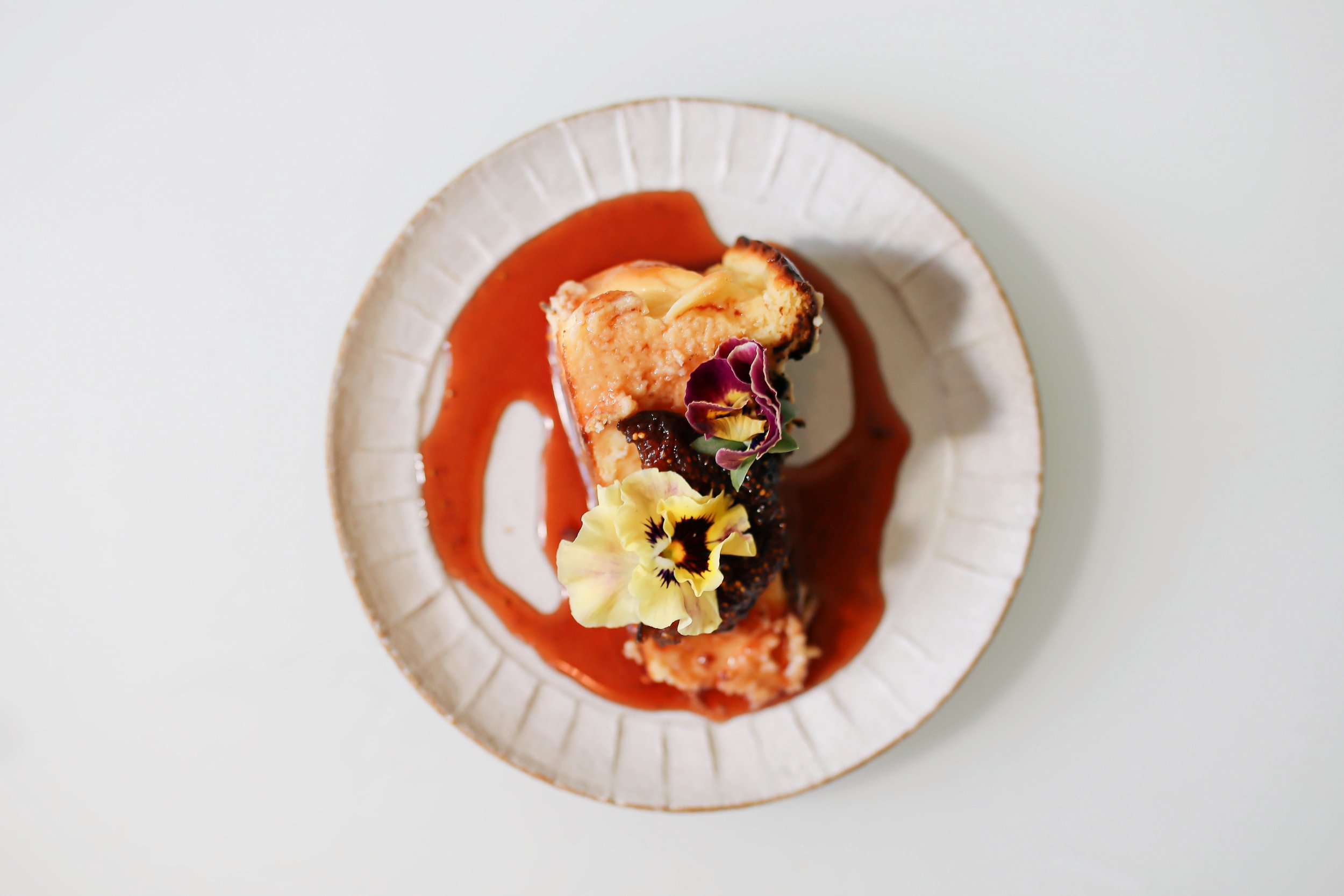Basque Cheesecake with Port Poached Figs
This Basque cheesecake is a no-fuss, high-reward dessert that skips the water bath and embraces the beauty of imperfection. Unlike the dense, carefully smoothed New York-style cheesecake, this version is boldly baked at a high heat to achieve its signature caramelized top—deeply browned, slightly cracked, and full of toasty, complex flavor. The inspiration came from a mind-blowing cheesecake I had at La Vara, one of my favorite restaurants in NYC, where they paired theirs with a savory tomatillo compote. I wanted to create my Iberian-inspired twist, so I poached figs in port wine until lush and jammy, then drizzled the syrup over each slice for a rich, fruity finish. For a final flourish, pick up some edible flowers at the farmers market—they’re the perfect pop of color against that dark, burnished top.
Servings: 10 to 12 slices
Equipment:
Hand mixer
9x13” spring form cake pan
Ingredients:
32 ounces full-fat cream cheese, room temperature
9 1/2 ounces sugar, plus 1 tablespoon (divided)
5 large eggs, room temperature
2 large egg yolks
8 fluid ounces heavy cream, room temperature
2 teaspoons vanilla extract
1 teaspoon lemon zest
1 teaspoon Diamond Crystal kosher salt
2 tablespoons all-purpose flour
3 cups dried figs
1½ cups granulated sugar
1 cup red wine vinegar
1 cup port
2 cinnamon sticks, broken
20 whole cloves
Edible flowers (optional)
Method:
Prepare the cake pan
Preheat the oven to 400°F. Cut two 12-by-16-inch pieces of parchment paper. Arrange them in an overlapping pattern to line a greased cake pan, leaving at least 1 inch of parchment overhanging the rim of the pan on all sides. Set aside.
Start the cake batter
In a large bowl, use a hand mixer to combine cream cheese and 9 1/2 ounces of sugar. Mix on medium-low speed, scraping down sides of bowl as needed, until no lumps of cheese remain, sugar is dissolved, and the mixture is smooth, about 3 to 4 minutes.
With the mixer on medium-low speed, add the eggs one at a time, beating for 10 seconds before adding the next. Add egg yolks, and beat on low speed until fully incorporated. Stop the mixer and scrape down the sides of the bowl with a silicone spatula, making sure the mixture is smooth and homogenous.
Finish and chill the cake batter
Add the heavy cream, vanilla, lemon zest, and salt. Mix on low speed until fully combined and smooth, about 15 seconds. Add the flour and beat on low speed just until combined, 15 to 30 seconds, stopping to scrape down sides of bowl as needed. Pour batter into the prepared pan, and refrigerate for at least 30 minutes and up to 1 hour.
Bake the cake
When ready to bake, remove the cake pan from the refrigerator, set it on a rimmed baking sheet, and sprinkle the remaining 1 tablespoon of sugar evenly over the surface. Bake the cheesecake, rotating the pan halfway, until the cheesecake slightly jiggles, the top is deeply browned, and the outer edge feels slightly firm, about 50 to 60 minutes (internal temp should register between 150 and 155ºF).
Poach the figs
Meanwhile, rinse the figs, cover with water, and simmer for 20 minutes. Drain, reserving the liquid. Return one cup of the cooking liquid to the pan, along with the remaining ingredients, and simmer briefly, just until the sugar dissolves. Return figs to the pan and simmer 10 minutes longer. Cover and let cool in syrup for at least 30 minutes.
Cool & serve
Let cheesecake cool in the pan on a wire rack at room temperature for 1 hour. Refrigerate uncovered for at least 4 hours before unmolding. To unmold the cheesecake, unlatch the springform pan and remove the pan sides. Holding by parchment overhang, carefully transfer the cake to a cutting board or serving plate. Gently peel back parchment from the sides of cheesecake, and use a sharp knife to cut into wedges. Top each slice with the poached figs and syrup and garnish with edible flowers, if desired.

